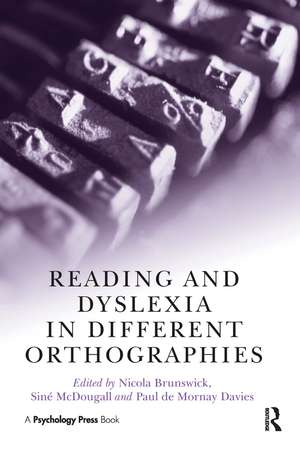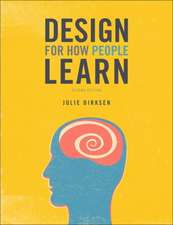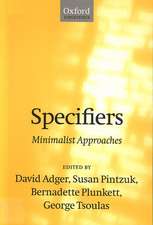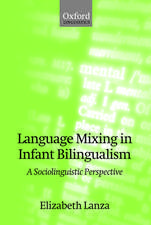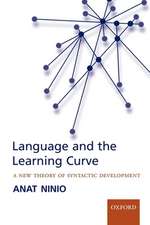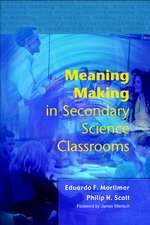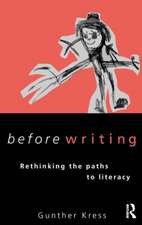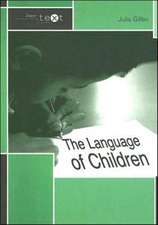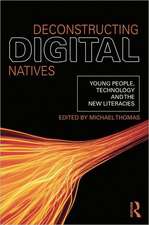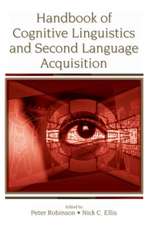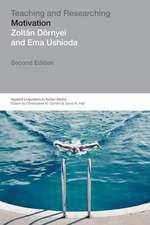Reading and Dyslexia in Different Orthographies
Editat de Nicola Brunswick, Sine McDougall, Paul de Mornay Daviesen Limba Engleză Paperback – 15 noi 2012
The book brings together contributions from a group of leading literacy researchers from around the world. It begins by examining the development of language skills in monolingual speakers of alphabetic and non-alphabetic languages; it then explores literacy acquisition in bilingual children learning to read in languages with different spelling-sound rules, including English, French, Greek, Welsh and Japanese. The second section is devoted to developmental dyslexia in monolingual and bilingual speakers of different languages and examines the impact of variations in orthography on the symptoms and aetiology of dyslexia. The final section explores the contribution of brain imaging to the study of impaired and unimpaired reading, giving an up-to-the-minute picture of how the brain deals with different languages and writing systems.
This is ideal reading for advanced undergraduates and postgraduates who have an interest in language acquisition, reading and spelling, as well as speech and language therapists, teachers and special educational needs professionals.
| Toate formatele și edițiile | Preț | Express |
|---|---|---|
| Paperback (1) | 470.15 lei 6-8 săpt. | |
| Taylor & Francis – 15 noi 2012 | 470.15 lei 6-8 săpt. | |
| Hardback (1) | 1006.60 lei 6-8 săpt. | |
| Taylor & Francis – 14 mai 2010 | 1006.60 lei 6-8 săpt. |
Preț: 470.15 lei
Nou
Puncte Express: 705
Preț estimativ în valută:
89.96€ • 94.18$ • 74.44£
89.96€ • 94.18$ • 74.44£
Carte tipărită la comandă
Livrare economică 07-21 aprilie
Preluare comenzi: 021 569.72.76
Specificații
ISBN-13: 9780415651332
ISBN-10: 0415651336
Pagini: 336
Ilustrații: 51 black & white illustrations, 7 black & white tables
Dimensiuni: 156 x 234 x 18 mm
Greutate: 0.47 kg
Ediția:1
Editura: Taylor & Francis
Colecția Psychology Press
Locul publicării:Oxford, United Kingdom
ISBN-10: 0415651336
Pagini: 336
Ilustrații: 51 black & white illustrations, 7 black & white tables
Dimensiuni: 156 x 234 x 18 mm
Greutate: 0.47 kg
Ediția:1
Editura: Taylor & Francis
Colecția Psychology Press
Locul publicării:Oxford, United Kingdom
Cuprins
U. Frith, Foreword. Part 1. The Development of Reading Skills in Different Orthographies. S. McDougall, N. Brunswick, P. de Mornay Davies, Reading and Dyslexia in Different Orthographies: An Introduction and Overview. U. Goswami, A Psycholinguistic Grain Size View of Reading Acquisition Across Languages. L.G. Duncan, Phonological Development from a Cross-Linguistic Perspective. M. Ktori, N. Pitchford, Letter Positioning Encoding Across Deep and Transparent Orthographies. J.R. Hanley, Differences in Reading Ability Between Children Attending Welsh and English-Speaking Primary Schools in Wales. T. Nunes, D. Burman, D. Evans, D. Bell, Writing a Language you Can't Hear. Part 2. Developmental Dyslexia in Different Orthographies. N. Brunswick, Unimpaired Reading Development and Dyslexia Across Different Languages. R. Davies, F. Cuetos, Reading Acquisition and Dyslexia in Spanish. D. Paizi, P. Zoccolotti, C. Burani, Lexical Reading in Italian Developmental Dyslexic Readers. I. Su, K. Klingebiel, B. Weekes, Dyslexia in Chinese: Implications for Connectionist Models of Reading. J. Everett, D. Ocampo, K. Veii, S. Nenopoulou, I. Smythe, H. al Mannai, G. Elbeheri, Dyslexia in Biscriptal Readers. Part 3. Neuroimaging Studies of Reading in Different Orthographies. E. Paulesu, N. Brunswick, F. Paganelle, Cross-Cultural Differences in Normal and Dyslexic Reading: Behavioural and Functional Anatomical Observations in Readers of Regular and Irregular Orthographies. B. Weekes, Lexical Retrieval in Alphabetic and Non-Alphabetic Scripts: Evidence From Brain Imaging.
Recenzii
"This book contains much of interest to the student of reading, and brings together considerable expertise on cross-linguistic differences in a single volume. I would recommend this book to anyone interested in obtaining a better understanding of how orthographies differ across languages and the implications for learning to read." - Colin J. Davis, Reader in Cognitive Psychology, Royal Holloway, University of London, UK
"Much of the research on learning to read and spell has examined a single language: English. This collection brings together research on a range of languages, looking at typical children and adults and also at people with reading problems. Together, the chapters contribute to a better understanding of reading and its development." - Rebecca Treiman, Professor of Child Developmental Psychology, Washington University in St. Louis, USA
"The editors have done a good job in bringing together chapters from well-known authors into a lively and accessible volume. This book is a timely and useful addition to the bookshelves of people within the community of reading research and dyslexia whilst also appealing to a more generalist professional audience." - Alan Beaton, Department of Psychology, University of Swansea, UK
"This book is aimed at advanced undergraduates and postgraduates, but its structure, the excellent index, the inclusion of a glossary, and the fluid writing by the contributing authors all make it very accessible both for those who know little about dyslexia and for those who have a particular interest in this area and want to find out more. This book will undoubtedly help anyone wishing to further their understanding of dyslexia by considering its manifestation in languages other than English, and I recommend it wholeheartedly to all those who are working with individuals who have dyslexia." – Nichola Stuart in International Journal of Language and Communication Disorders
"As a specific language impairment therapist working bilingually I found the information interesting and informative." – Lowri Jones, specialist speech and language therapist, in Speech and Language Therapy in Practice
"This book contains much of interest to the student of reading, and brings together considerable expertise on cross-linguistic differences in a single volume. I would recommend this book to anyone interested in obtaining a better understanding of how orthographies differ across languages and the implications for learning to read." - Colin J. Davis, Reader in Cognitive Psychology, Royal Holloway, University of London, UK
"Much of the research on learning to read and spell has examined a single language: English. This collection brings together research on a range of languages, looking at typical children and adults and also at people with reading problems. Together, the chapters contribute to a better understanding of reading and its development." - Rebecca Treiman, Professor of Child Developmental Psychology, Washington University in St. Louis, USA
"The editors have done a good job in bringing together chapters from well-known authors into a lively and accessible volume. This book is a timely and useful addition to the bookshelves of people within the community of reading research and dyslexia whilst also appealing to a more generalist professional audience." - Alan Beaton, Department of Psychology, University of Swansea, UK
"Much of the research on learning to read and spell has examined a single language: English. This collection brings together research on a range of languages, looking at typical children and adults and also at people with reading problems. Together, the chapters contribute to a better understanding of reading and its development." - Rebecca Treiman, Professor of Child Developmental Psychology, Washington University in St. Louis, USA
"The editors have done a good job in bringing together chapters from well-known authors into a lively and accessible volume. This book is a timely and useful addition to the bookshelves of people within the community of reading research and dyslexia whilst also appealing to a more generalist professional audience." - Alan Beaton, Department of Psychology, University of Swansea, UK
"This book is aimed at advanced undergraduates and postgraduates, but its structure, the excellent index, the inclusion of a glossary, and the fluid writing by the contributing authors all make it very accessible both for those who know little about dyslexia and for those who have a particular interest in this area and want to find out more. This book will undoubtedly help anyone wishing to further their understanding of dyslexia by considering its manifestation in languages other than English, and I recommend it wholeheartedly to all those who are working with individuals who have dyslexia." – Nichola Stuart in International Journal of Language and Communication Disorders
"As a specific language impairment therapist working bilingually I found the information interesting and informative." – Lowri Jones, specialist speech and language therapist, in Speech and Language Therapy in Practice
"This book contains much of interest to the student of reading, and brings together considerable expertise on cross-linguistic differences in a single volume. I would recommend this book to anyone interested in obtaining a better understanding of how orthographies differ across languages and the implications for learning to read." - Colin J. Davis, Reader in Cognitive Psychology, Royal Holloway, University of London, UK
"Much of the research on learning to read and spell has examined a single language: English. This collection brings together research on a range of languages, looking at typical children and adults and also at people with reading problems. Together, the chapters contribute to a better understanding of reading and its development." - Rebecca Treiman, Professor of Child Developmental Psychology, Washington University in St. Louis, USA
"The editors have done a good job in bringing together chapters from well-known authors into a lively and accessible volume. This book is a timely and useful addition to the bookshelves of people within the community of reading research and dyslexia whilst also appealing to a more generalist professional audience." - Alan Beaton, Department of Psychology, University of Swansea, UK
Descriere
This text provides a unique and accessible insight into current research in different orthographies. It presents cross-language comparisons to provide insights into universal aspects of reading development and developmental dyslexia.
